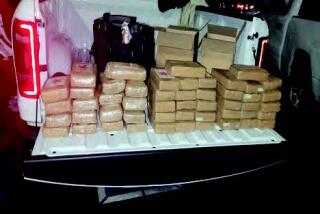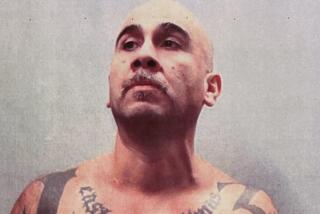Terrorists Received Drug Money, U.S. Says
Federal investigators have uncovered significant evidence that proceeds from a nationwide narcotics trafficking ring have been funneled to terrorist organizations in the Middle East, the head of the Drug Enforcement Administration said Thursday.
DEA Administrator Asa Hutchinson said in an interview that investigators believe a portion of the millions of dollars collected by suppliers of a methamphetamine ring went to the Iranian-backed terrorist group Hezbollah.
Some money also has been traced to defendants’ families in Lebanon, Yemen and other Mideast countries, Hutchinson added, raising the possibility that illicit proceeds have been forwarded to other terrorist groups.
“Let me make it clear,” Hutchinson said. “I am satisfied that portions of the drug sales have moved back to the Middle East and portions of that are going to support terrorist organizations.
“Clearly, this is the first time we have seen with drug transactions in the United States where proceeds are actually going back to fund terrorism” in the Mideast, he said.
While the information is known to the FBI and federal prosecutors, Hutchinson said, he could not discuss the possibility of additional charges being filed because of the ongoing nature of the investigation.
The probe, dubbed Operation Mountain Express, was launched in 1999 and so far has resulted in the arrests of more than 300 people for allegedly producing methamphetamine using vast quantities of the over-the-counter cold medicine ingredient, pseudoephedrine. Arrests have been made in a dozen major cities, from Los Angeles to Detroit.
Attorneys representing several of the Los Angeles defendants dismissed the notion Thursday that proceeds from the drug ring went to fund terrorist activities.
“I don’t think there is a shred of evidence that there is any connection” between this case and funding terrorism, said attorney David A. Katz, a former assistant U.S. attorney representing Khalil Mohammed, who faces numerous counts, including allegedly conspiring to help manufacture methamphetamine.
Added defense attorney Mark Werksman, also a former federal prosecutor: “I haven’t seen any evidence suggesting a connection to terrorism, and this sounds like an inflammatory suggestion designed to prejudice the public against our clients.” Werksman represents Adnan Isa, a Chicago resident accused of conspiring to supply pseudoephedrine to California clients.
The comments by the DEA’s Hutchinson, a former Republican congressman from Arkansas, come several months after authorities announced the latest round of arrests in the long-running drug probe.
Operation Mountain Express, which involves other law enforcement agencies, including the Royal Canadian Mounted Police, first targeted U.S. individuals and companies that were illegally supplying methamphetamine producers with pseudoephedrine.
After an initial round of arrests and drug seizures dried up domestic sources of the chemical, law enforcement officials said, narcotics traffickers turned to suppliers in Canada.
That phase of the investigation, according to one January federal grand jury indictment in Los Angeles, uncovered a vast smuggling operation with huge shipments of the chemical transported from Canada to Chicago and Detroit and then on to methamphetamine producers in California.
In Los Angeles alone, a federal indictment charged 36 people with drug trafficking in Riverside and San Bernardino counties--an area long considered the methamphetamine capital of the world. In all, more than 100 people were arrested in 12 U.S. cities where, authorities say, they also seized enough pseudoephedrine to produce nine tons of methamphetamine.
At that time, authorities said, Operation Mountain Express already had resulted in the seizure of more than 30 tons of pseudoephedrine and $16 million in U.S. currency.
While a number of those arrested were of Middle Eastern descent, Hutchinson and other federal authorities said in January that their investigation had turned up no evidence that the drug proceeds were sent to terrorist organizations.
Since then, Hutchinson said Thursday, investigators have found significant links between the drug ring and terrorism.
“In January, I made the statement that there was no evidence we had to show money went for terrorism purposes,” Hutchinson said. “I will say that has changed based on our ongoing investigation.”
While emphasizing that investigators had not linked the drug proceeds to any specific act of terrorism, Hutchinson said, they have found proof that money is making its way to extremists. He declined to offer details of the proof.
Pinpointing who has received the money has been difficult, Hutchinson said, in part because the transfers from defendants here to the Middle East have gone out in “bulk form cash which is difficult to trace.”
Defense attorney Katz, whose client is a Jordanian American, was skeptical that authorities will find any specific links between the alleged drug ring and terrorism.
“This doesn’t apply to my client. He didn’t send ... a dime to anyone,” Katz said. “But it may be some of the other defendants did send money home. That is the immigrant experience: to come to America and send back some of the money you have made.”
If some money has been stolen by a criminal or terrorism group, Katz added, there is a “big difference between sending money home and having it taken in an involuntary tithing ... and sending it to Hezbollah.”
Times staff writer Rich Connell contributed to this report.
More to Read
Sign up for Essential California
The most important California stories and recommendations in your inbox every morning.
You may occasionally receive promotional content from the Los Angeles Times.










